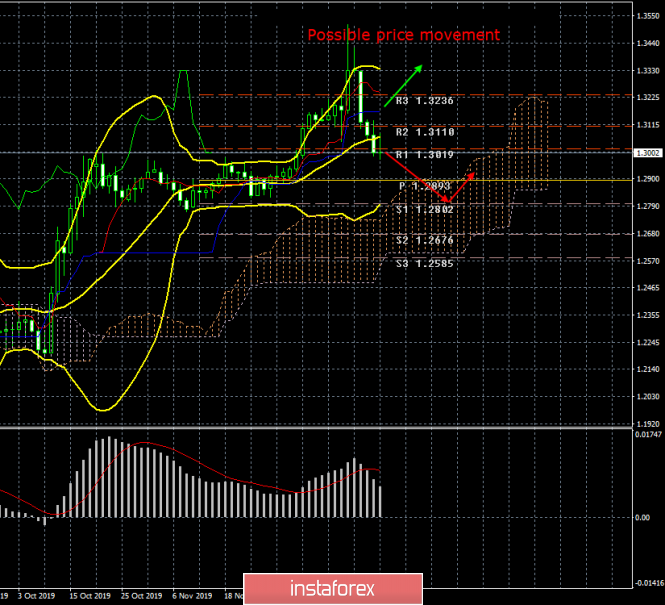24-hour timeframe

In recent weeks, when the pound sterling, having no fundamental reasons and reasons, resumed the upward movement, and then, after the parliamentary elections were over and it became clear that Brexit could no longer be avoided, it began a rather strong fall, we repeatedly focused the attention of traders on the fact that Brexit - is in any case for the UK - a negative phenomenon. No matter how Great Britain makes a "divorce" with the European Union, this is a breakdown of all ties in any case, a loss of all agreements in all spheres of life, from production, supply of raw materials, trade operations to immigration and security issues. Thus, the "soft" Brexit was originally planned, that is, Brexit with agreements, as a result of which the economies of both the EU and Great Britain will suffer minimally. However, this kind of package of agreements also means for the UK that it will continue to remain dependent on the European Union in many matters. That is, the softer Brexit, the more relations with the EU will remain, which is completely unsatisfactory for the British, who want complete freedom of action in all matters. Thus, the UK and its government are now facing a dilemma. Or all the same hard Brexit until the end of 2020, which is formally not hard, but without concluding agreements in all areas during the transition period, will be just that in fact. Or at least a minimal package of agreements, so to speak, a basic version. This case will now entirely depend on Boris Johnson, who, recall, was initially not at all against the completely hard Brexit. What is the likelihood that Johnson will try to conclude an agreement with which Britain will suffer the least losses if its main goal is to keep as few dependencies between the Great Britain and EU as possible?
Thus, we already have two potential scenarios. The first is to exit by the end of 2020 without any agreements, without extending the transition period, in fact, according to a hard scenario. Considering the fact that in 11 months it is almost impossible to agree on a huge package of agreements, and work in this direction has not even begun in any case, this option seems most likely. The second option is a basic trade deal with low fees. However, this option is immediately unlikely to be seen, since it will be necessary to follow EU standards in many sectors, which Johnson's government does not want. The third option is a comprehensive trade agreement on the principles of the free market, but in fact this option is still the same EU membership, so the likelihood of this option being fulfilled is even lower than that of the second.
Several experts believe that negotiations between the EU and the UK themselves can be very difficult. One could also say very long, but given the desire of the British prime minister to leave the EU as soon as possible, then most likely they will be completed by the end of 2020. What brings both sides closer to the hard scenario of divorce is the fact that Johnson takes a very principled position, in the style of Donald Trump: either "a deal on our terms" or "no deal". Firstly, this factor will complicate the negotiations, and secondly, the factor of lack of experience in conducting trade negotiations with Britain over the past 40 years. Thus, the parties most likely simply will not be able to agree.
What does all this mean for the pound? Just that the pound will again face problems, like the entire UK economy. Considering how much the pound has fallen in price, how much the British economy has sunk in recent years, and this is still with the UK retaining EU membership, what will happen when the divorce is officially formalized? It is good if it is orderly, but Johnson, with all his looks and actions, shows that there will hardly be a positive outcome in the negotiations. Thus, we believe that the pound has justifiably resumed the downward movement, and should continue it in the short, medium and long term.
At the moment, the pound/dollar pair has already gone far below the Kijun-sen critical line on the 24-hour timeframe, so the first step in the direction of a new downward trend has been taken. Now we are waiting for a decline, at least, in the area of 1.2600 - 1.2800, that is, in the Ichimoku cloud.
Trading recommendations:
On the 24-hour timeframe, the pound/dollar started a strong downward movement. Thus, long positions are not relevant now. It is much more advisable to sell the pound/dollar pair with goals between the levels of 1.2600 and 1.2800. It is recommended to track more accurate goals and the picture on a 4-hour timeframe.
In addition to the technical picture, fundamental data and the time of their release should also be taken into account.
Explanation of the illustration:
Ichimoku indicator:
Tenkan-sen is the red line.
Kijun-sen is the blue line.
Senkou Span A - light brown dotted line.
Senkou Span B - light purple dashed line.
Chikou Span - green line.
Bollinger Bands Indicator:
3 yellow lines.
MACD indicator:
Red line and bar graph with white bars in the indicators window.
The material has been provided by InstaForex Company - www.instaforex.com